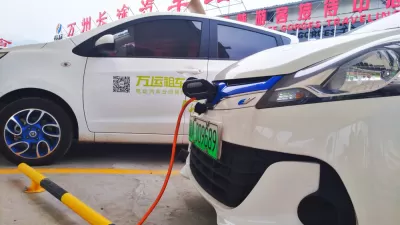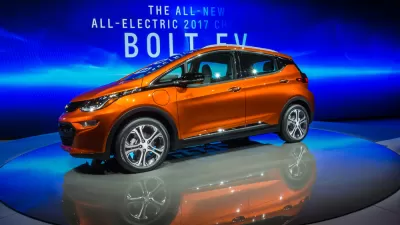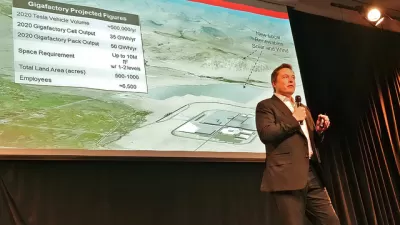The generous incentives granted the electric car company for securing the $5 billion factory will yield disproportionate economic benefits, according to Gov. Brian Sandoval, for a state suffering high unemployment and a lack of economic diversity.
The $1.2 billion incentive package far exceeded the 10% or $500 million that Tesla had expected—at a minimum.
"Nevada's Legislature will seek to approve a bill that will allow Tesla to receive between $750 million and $1 billion in tax abatements and $195 million in tax credits," writes Mike Ramsey of The Wall Street Journal. However, "the state expects that over 20 years the plant still will generate $1.9 billion in tax revenue," he adds.
According to David R. Baker of the San Francisco Chronicle, "Tesla won't have to pay sales tax for 20 years. The company also won't have to pay real property, personal property and modified business taxes for 10 years." Plus, Baker reminds us that "the state has no corporate income tax - an obvious draw."
"Gov. Brian Sandoval estimates (it) would have a $100 billion economic impact over the next 20 years for a state that today has relatively little manufacturing," writes Ramsey. Indeed, it "represents less than 4% of the workforce in the state, compared with the dominant leisure and hospitality industry, which is more than 25%, according to the Bureau of Labor Statistics," adds Ramsey.
Manufacturing's share of gross domestic product is 4.1% in Nevada, lower than in Texas, New Mexico, California and Arizona, the states that were in competition for the factory.
By contrast, 10.6% of California's GDP and 15.9% of Texas' GDP is from manufacturing. In Arizona, the share of the state's workforce in manufacturing jobs is nearly double the share in Nevada.
It's important not to lose sight of the purpose of the so-called gigafactory [it will produce 35 gigawatt hours of battery cells annually] though, regardless of the amount of incentives offered by Nevada. "The Gigafactory is an important step in advancing the cause of sustainable transportation and will enable the mass production of compelling electric vehicles for decades to come," Musk said Thursday, writes Baker.
Specifically, "Tesla Chief Executive Elon Musk said the proposed battery factory 'is critical to our efforts to deliver our mass-market car,' the forthcoming Model 3, which would start at $35,000 and travel 200 miles on an electric charge," adds Ramsey.
Factoids on the plant (gleaned from both articles):
- The auto maker has said it plans to employ up to 6,500 workers. The governor said the average wage at the plant would be $25 per hour. This is in addition to the 3,000 construction jobs created to build the plant.
- Nevada boasts America's only operating lithium mine, producing the raw material for Tesla's batteries.
- The plant eventually is expected to produce more than all of the current lithium-ion battery production in the world today, doubling the world's current production of this type of battery.
- Tesla has a commitment from Panasonic Corp., which now supplies batteries for the company's Model S, to help run the battery cell making operations and underwrite some of the costs. In a July call with investors, Mr. Musk said he expected Panasonic to contribute between 30% and 40% of the up to $5 billion total cost of the factory.
As for California's bid, or lack thereof, conflicting information comes from the San Francisco Chronicle.
"California's bid was worth roughly $500 million, according to one of the state legislators involved in the process," writes Baker of the San Francisco Chronicle. "Tesla executives said they expected the winner to offer incentives worth roughly 10 percent of the project's total cost, or $500 million," he adds.
However, the paper's editorial reads, "A [California] legislative measure that offered tax incentives and speeded-up approvals failed to materialize amid doubts about favoring one business."
Finally, Adam Snider of Politico Morning Transportation reminds us in Friday's email under the subject heading, "GAMBLING ON A GIGAFACTORY", that "the success of Tesla's project is far from a sure thing."
The numbers behind Tesla's new electric car battery factory in Nevada are impressive...another number should scare both Tesla's stockholders and Nevada's taxpayers: 1 percent. That's how big a share of the automotive market the EPA predicts plug-in electric vehicles will command by 2020 - barely larger than today's 0.8 percent. http://politico.pro/1raphSF [subscription only].
Correspondent's note: Subscriber-only content to Wall Street Journal article will be available to non-subscribers for up to seven days after Sept. 05.
FULL STORY: Tesla Confirms Nevada to Get Battery Factory

Planetizen Federal Action Tracker
A weekly monitor of how Trump’s orders and actions are impacting planners and planning in America.

Maui's Vacation Rental Debate Turns Ugly
Verbal attacks, misinformation campaigns and fistfights plague a high-stakes debate to convert thousands of vacation rentals into long-term housing.

Restaurant Patios Were a Pandemic Win — Why Were They so Hard to Keep?
Social distancing requirements and changes in travel patterns prompted cities to pilot new uses for street and sidewalk space. Then it got complicated.

In California Battle of Housing vs. Environment, Housing Just Won
A new state law significantly limits the power of CEQA, an environmental review law that served as a powerful tool for blocking new development.

Boulder Eliminates Parking Minimums Citywide
Officials estimate the cost of building a single underground parking space at up to $100,000.

Orange County, Florida Adopts Largest US “Sprawl Repair” Code
The ‘Orange Code’ seeks to rectify decades of sprawl-inducing, car-oriented development.
Urban Design for Planners 1: Software Tools
This six-course series explores essential urban design concepts using open source software and equips planners with the tools they need to participate fully in the urban design process.
Planning for Universal Design
Learn the tools for implementing Universal Design in planning regulations.
Heyer Gruel & Associates PA
JM Goldson LLC
Custer County Colorado
City of Camden Redevelopment Agency
City of Astoria
Transportation Research & Education Center (TREC) at Portland State University
Jefferson Parish Government
Camden Redevelopment Agency
City of Claremont





























